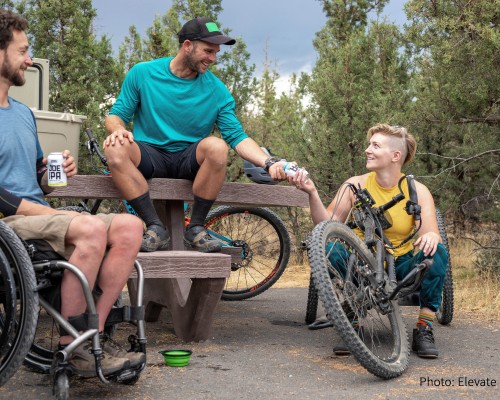Stop Comparing Yourself to Your Non-Disabled Counterparts (Mental Health Series Part Six)

Welcome back to this series on mental health. I am thrilled you have joined me. As I mentioned in the first part of this series, I want to talk to you about the effects of comparing ourselves to others.
We compare ourselves to others daily in all areas of life, especially now that we have such easy access to social media. We compare our bodies to others, our physical independence to others, and how much we may get done in a day to others.
I have learned that comparing these areas of our lives to those who do not have a disability is not only damaging, but it is unrealistic and only causes your inner critic to be a real jerk. The reality is, as someone with an SCI:
- Your body will look slightly different and depending on the amount of muscle function you still have, you may never be able to have a tight, toned body due to “turned off muscles”, as I like to say.
- We can achieve a level of personal independence similar to what we had before our SCIs. However, we will need to do things differently and depending on the level of our injury, we may need help from others.
- You now have a different routine for getting ready for the day, getting ready for bed, emptying your bowels, and getting to the places you need to be. All of which now often take longer than they did before your injury. Plus, you may be slower at typing or using voice-to-text software. You may need regular chair maintenance. You likely experience more chronic pain and fatigue than before your SCI, and may have many rehabilitation appointments. All of which, although important, take additional time out of your day.
Each of these points is entirely okay and does not make you any less worthy or driven. They mean that your lifestyle and appearance are slightly different. You need to consider more things in your day, and you may need accommodations that non-disabled people do not, such as larger and closer parking spots or additional time for an exam.
For example, although I am a full-time student in university and I get good marks, I take fewer classes than most of my peers. I do not understand how non-disabled people take five classes, let alone how I could ever do so and still do well. I have learned that two university classes are as much as I can handle, especially when I am doing research work and volunteering on the side. Nevertheless, I still have thoughts that tell me I am not doing enough and falling behind my non-disabled peers. I sometimes wonder if I can ever do enough. I sometimes think I may not be worthy, or that my disability makes me less of a student or employee. Schooling and career are just two facets of my life that my inner critic compares to non-disabled individuals.
However, if I take a step back and look at myself as an objective observer, I see that these thoughts are slightly ridiculous. My life, just like yours, is not the same as those who are not disabled. Learning to stop comparing myself to others, focusing on being the best version of myself, and forming realistic but still high expectations for myself, after considering what my life is like now, has been the kindest thing I have done for myself in a long time. Do not get me wrong, you may still constantly need to work on these perceptions, but doing so and avoiding comparisons will likely make you a happier, more confident person.
Conclusion
So, comparing yourself with another who is not disabled or even others who have disabilities does not make sense. All you can do is focus on your behaviour, be the best person you can be, and be proud of who you are because that makes you worthy, successful, and beautiful.
I invite you to read my next blog!
